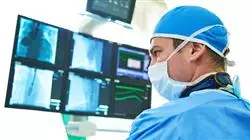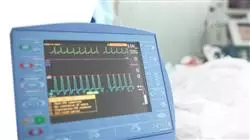University certificate
The world's largest faculty of medicine”
Introduction to the Program
Become an expert in Management of the Patient with ST-Segment Elevation ACS thanks to this comprehensive program and renew your knowledge in less time than expected”

ST-segment elevation ACS is a condition that worries not only cardiologists, but also primary care physicians and emergency physicians. This heart disease is as common as it is serious and affects millions of patients worldwide, some with risk factors or heredity and others with no previous pathology. Regardless of the causes, a correct, but above all, rapid diagnosis can have a positive influence on the patient's health and that is why these specialists need to keep up to date with the latest developments in techniques and treatments.
With the aim of updating and expanding their knowledge based on the most modern research, TECH presents the Postgraduate diploma in the Management of Patients with ST-Elevation ACS, a comprehensive program that covers everything from the patient arrival and pre-hospital evaluation in the emergency department to management in the Coronary Unit, with emphasis on reperfusion therapies and arrhythmias in these patients.
The specialist will be able, through this program, to get up to date on the latest pharmacological treatment in the initial phase, as well as on the most recommended complementary tests after admission. In addition, the program focuses on the most effective strategies currently available to reduce heart attack severity: fibrinolysis and primary angioplasty.
A 100% online degree with which, in just six months, you will become an expert in this field. For this purpose, you will not only have the best and most complete syllabus, but you will also have at your disposal a teaching team of experts in cardiology and a lot of complementary material with which to continue expanding concepts. Everything is available from the beginning of the program and 24 hours a day, so that the graduates set the time and thus, get the most out of this program.
A qualification that will help you to implement the most modern pharmacological treatments for ACS in your daily life”
This Postgraduate diploma in Management of the Patient with ST-Segment Elevation ACS contains the most complete and up-to-date scientific program on the market. The most important features include:
- The development of practical cases presented by experts in Cardiology
- The graphic, schematic, and practical contents with which they are created, provide scientific and practical information on the disciplines that are essential for professional practice
- Practical exercises where self-assessment can be used to improve learning
- Its special emphasis on innovative methodologies
- Theoretical lessons, questions to the expert, debate forums on controversial topics, and individual reflection assignments
- Content that is accessible from any fixed or portable electronic device with an Internet connection
Having internalized the hemodynamic support measures during primary angioplasty is as difficult as it is necessary. With TECH's pedagogical methodology you will be able to remember and apply them without complications”
The program’s teaching staff includes professionals from sector who contribute their work experience to this educational program, as well as renowned specialists from leading societies and prestigious universities.
Its multimedia content, developed with the latest educational technology, will provide the professional with situated and contextual learning, i.e., a simulated environment that will provide an immersive education programmed to learn in real situations.
The design of this program focuses on Problem-Based Learning, by means of which the professionals must try to solve the different professional practice situations that are presented throughout the program. For this purpose, the student will be assisted by an innovative interactive video system created by renowned experts.
You will have access to real clinical cases in the virtual classroom that will allow you to put into practice the content developed during the program"

Update the concepts that will allow you to evaluate, in a more effective way, the patient with ST-Segment Elevation ACS in the pre-arrival phase to the hospital"
Why study at TECH?
TECH is the world’s largest online university. With an impressive catalog of more than 14,000 university programs available in 11 languages, it is positioned as a leader in employability, with a 99% job placement rate. In addition, it relies on an enormous faculty of more than 6,000 professors of the highest international renown.

Study at the world's largest online university and guarantee your professional success. The future starts at TECH”
The world’s best online university according to FORBES
The prestigious Forbes magazine, specialized in business and finance, has highlighted TECH as “the world's best online university” This is what they have recently stated in an article in their digital edition in which they echo the success story of this institution, “thanks to the academic offer it provides, the selection of its teaching staff, and an innovative learning method aimed at educating the professionals of the future”
A revolutionary study method, a cutting-edge faculty and a practical focus: the key to TECH's success.
The most complete study plans on the university scene
TECH offers the most complete study plans on the university scene, with syllabuses that cover fundamental concepts and, at the same time, the main scientific advances in their specific scientific areas. In addition, these programs are continuously being updated to guarantee students the academic vanguard and the most in-demand professional skills. In this way, the university's qualifications provide its graduates with a significant advantage to propel their careers to success.
TECH offers the most comprehensive and intensive study plans on the current university scene.
A world-class teaching staff
TECH's teaching staff is made up of more than 6,000 professors with the highest international recognition. Professors, researchers and top executives of multinational companies, including Isaiah Covington, performance coach of the Boston Celtics; Magda Romanska, principal investigator at Harvard MetaLAB; Ignacio Wistumba, chairman of the department of translational molecular pathology at MD Anderson Cancer Center; and D.W. Pine, creative director of TIME magazine, among others.
Internationally renowned experts, specialized in different branches of Health, Technology, Communication and Business, form part of the TECH faculty.
A unique learning method
TECH is the first university to use Relearning in all its programs. It is the best online learning methodology, accredited with international teaching quality certifications, provided by prestigious educational agencies. In addition, this disruptive educational model is complemented with the “Case Method”, thereby setting up a unique online teaching strategy. Innovative teaching resources are also implemented, including detailed videos, infographics and interactive summaries.
TECH combines Relearning and the Case Method in all its university programs to guarantee excellent theoretical and practical learning, studying whenever and wherever you want.
The world's largest online university
TECH is the world’s largest online university. We are the largest educational institution, with the best and widest online educational catalog, one hundred percent online and covering the vast majority of areas of knowledge. We offer a large selection of our own degrees and accredited online undergraduate and postgraduate degrees. In total, more than 14,000 university degrees, in eleven different languages, make us the largest educational largest in the world.
TECH has the world's most extensive catalog of academic and official programs, available in more than 11 languages.
Google Premier Partner
The American technology giant has awarded TECH the Google Google Premier Partner badge. This award, which is only available to 3% of the world's companies, highlights the efficient, flexible and tailored experience that this university provides to students. The recognition as a Google Premier Partner not only accredits the maximum rigor, performance and investment in TECH's digital infrastructures, but also places this university as one of the world's leading technology companies.
Google has positioned TECH in the top 3% of the world's most important technology companies by awarding it its Google Premier Partner badge.
The official online university of the NBA
TECH is the official online university of the NBA. Thanks to our agreement with the biggest league in basketball, we offer our students exclusive university programs, as well as a wide variety of educational resources focused on the business of the league and other areas of the sports industry. Each program is made up of a uniquely designed syllabus and features exceptional guest hosts: professionals with a distinguished sports background who will offer their expertise on the most relevant topics.
TECH has been selected by the NBA, the world's top basketball league, as its official online university.
The top-rated university by its students
Students have positioned TECH as the world's top-rated university on the main review websites, with a highest rating of 4.9 out of 5, obtained from more than 1,000 reviews. These results consolidate TECH as the benchmark university institution at an international level, reflecting the excellence and positive impact of its educational model.” reflecting the excellence and positive impact of its educational model.”
TECH is the world’s top-rated university by its students.
Leaders in employability
TECH has managed to become the leading university in employability. 99% of its students obtain jobs in the academic field they have studied, within one year of completing any of the university's programs. A similar number achieve immediate career enhancement. All this thanks to a study methodology that bases its effectiveness on the acquisition of practical skills, which are absolutely necessary for professional development.
99% of TECH graduates find a job within a year of completing their studies.
Postgraduate Diploma in Management of Patients with ST-Segment Elevation ACS
Acute Coronary Syndrome with ST-segment elevation is postulated as one of the most complex diseases within the field of Cardiology due to its variety of clinical presentations and the serious consequences of late diagnosis. However, constant advances in research have allowed the development of new assessment techniques and treatments, which means that specialists must be constantly up to date to provide the best care to their patients. In order to facilitate this process, this Postgraduate Diploma in Management of Patients with ST-Segment Elevation ACS has been created, which covers everything from prehospital presentation and evaluation of the patient in the Emergency Department to management in the Coronary Unit.
Get up to date on the latest advances in Antianginal, Lipid-lowering and Antithrombotic Treatment
This Postgraduate Diploma in Management of Patients with ST-Segment Elevation ACS also delves into Reperfusion Therapies and Arrhythmias in STE-ACS. Therefore, the program offers the specialist the opportunity to update their knowledge on pharmacological treatment in the initial phase and the complementary tests recommended for Acute Coronary Syndrome with ST-segment elevation. In addition, the title focuses on the most effective strategies to reduce infarct size, such as Fibrinolysis and Primary Angioplasty. In fact, in just 6 months the student will be able to become an expert in this area of Medicine through a 100% online program. In this sense, the syllabus provides a complete syllabus and supplementary material from experts in Cardiology, available 24 hours a day so that the student can adapt their study pace to their needs.







